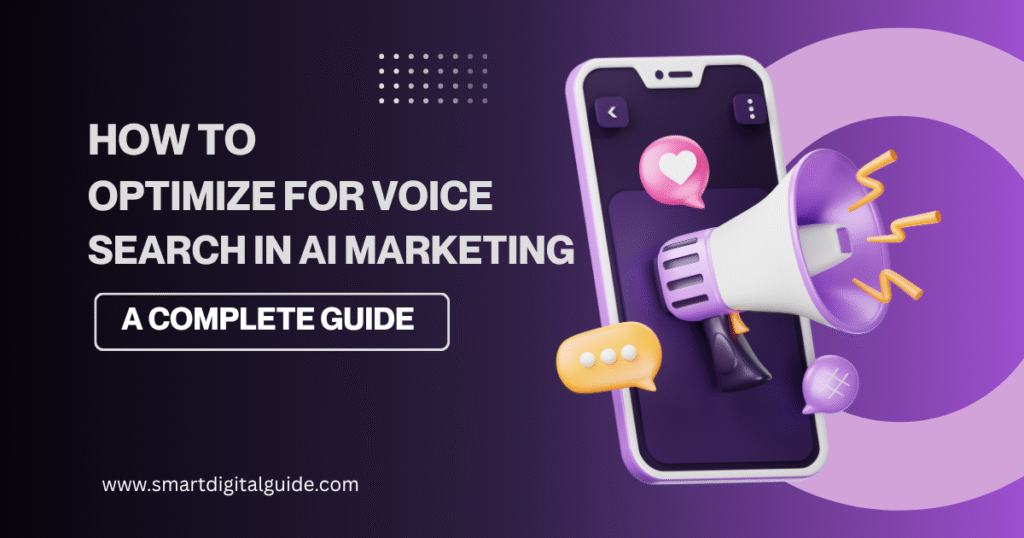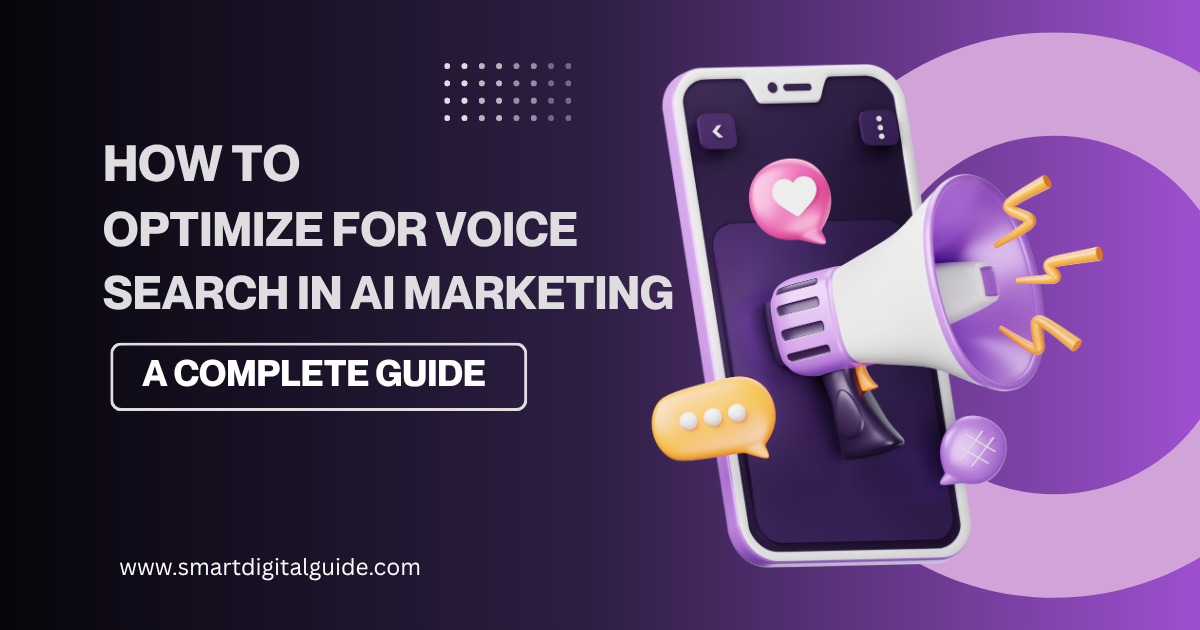Voice search has transitioned from a novel and futuristic option to an essential part of daily life. Thanks to advancements in AI, voice search is evolving to be more precise, quicker, and tailored to individual users. Projections indicate that by 2025, more than half of all online inquiries will rely on voice commands.
If you work in marketing and haven’t yet adapted your strategies for voice search, you could be overlooking a significant audience. This guide aims to help you master the art of optimizing for voice search within AI marketing so you can maintain your competitive edge.

What is Voice Search Optimization in AI Marketing?
Voice search optimization entails adjusting your digital content to make it easily accessible via spoken questions. Instead of entering queries, users now interact with devices like Alexa, Siri, or Google Assistant through more natural and conversational language.
Within AI marketing, voice search optimization combines strategies from search engine practices with the power of artificial intelligence to improve understanding of user intent and generate more effective responses. This allows brands to deliver faster and more relevant results.
Why Voice Search Matters for Modern Marketing
- Hands-Free Convenience – Voice search allows users to receive answers without needing to type, leading to faster and more efficient exchanges.
- Mobile-First Behavior – With mobile devices dominating online activity, the incidence of voice searches continues to increase annually.
- Boosted Local SEO – A significant number of voice queries include terms like “near me,” underscoring its relevance for local businesses.
- Better Engagement – Users frequently express longer inquiries, offering extra context that assists AI in delivering precise responses.
Step-by-Step Process to Optimize for Voice Search in AI Marketing
1. Use Conversational and Long-Tail Keywords
Voice searches tend to be more conversational and centered around inquiries. Rather than using short keywords like “digital marketing tips,” individuals are likely to pose questions such as, “What are the top digital marketing suggestions for beginners in 2025?”
Tips:
- Make use of tools like AnswerThePublic and SEMrush to identify keywords presented as questions.
- Include terms such as “who,” “what,” “where,” “when,” and “how” in your content.
2. Improve Website Speed & Mobile Friendliness
Google highlights the significance of websites that load quickly and operate smoothly on mobile devices.
Action Steps:
- Use Google PageSpeed Insights to identify any issues related to performance.
- Choose a responsive design for your site.
- Enhance images without compromising their quality.
3. Optimize for Local SEO
Since many voice searches are focused on local details, it is crucial to ensure that your local business information is correct.
Action Steps:
- Regularly update your Google My Business profile.
- Ensure that your location is included in meta titles, descriptions, and headings.
- Integrate phrases such as “near me” and “open now” naturally into your content.
4. Create FAQ Pages for Voice Search
AI voice assistants often pull answers from FAQ sections.
Tips:
- Rephrase inquiries in a way that mirrors everyday conversational language.
- Implement schema markup to assist search engines in understanding and showcasing your responses effectively.
5. Use AI for Personalized Search Results
AI helps in understanding user behavior and delivering personalized results.
Examples:
- Voice assistant-integrated chatbots.
- E-commerce platforms utilizing AI-driven recommendation systems.
AI Tools to Boost Voice Search Optimization
- ChatGPT – Ideal for generating ideas for conversational content.
- Google Bard – Useful for discovering popular keywords and themes.
- SEMrush / Ahrefs – Effective in pinpointing long-tail and question-oriented keywords.
- Schema.org Generator – Assists in developing structured data for FAQ sections and local SEO.
Common Mistakes to Avoid
- Ignoring Mobile Optimization – As voice searches mainly take place on mobile devices, a slow-loading mobile site can harm your rankings.
- Overusing Short Keywords – Instead, focus on using natural and conversational phrases.
- Not Updating Business Listings – Incorrect addresses or phone numbers can undermine your local SEO initiatives.
Future of Voice Search in AI Marketing
The future is headed towards increasingly personalized, AI-enhanced voice interactions. As AR/VR technology, smart home devices, and sophisticated AI assistants come together, voice search will become significantly more engaging. Companies that begin optimizing their strategies now will secure a competitive edge for the future.
Conclusion
Improving your AI marketing approach for voice search isn’t merely a passing trend—it represents the future of our digital interactions. By incorporating conversational keywords, focusing on mobile optimization, enhancing local SEO, and utilizing AI technologies, you can attract more visitors from voice searches while elevating your brand’s visibility. Begin implementing these tactics now to prepare for the anticipated growth in AI-driven searches.









